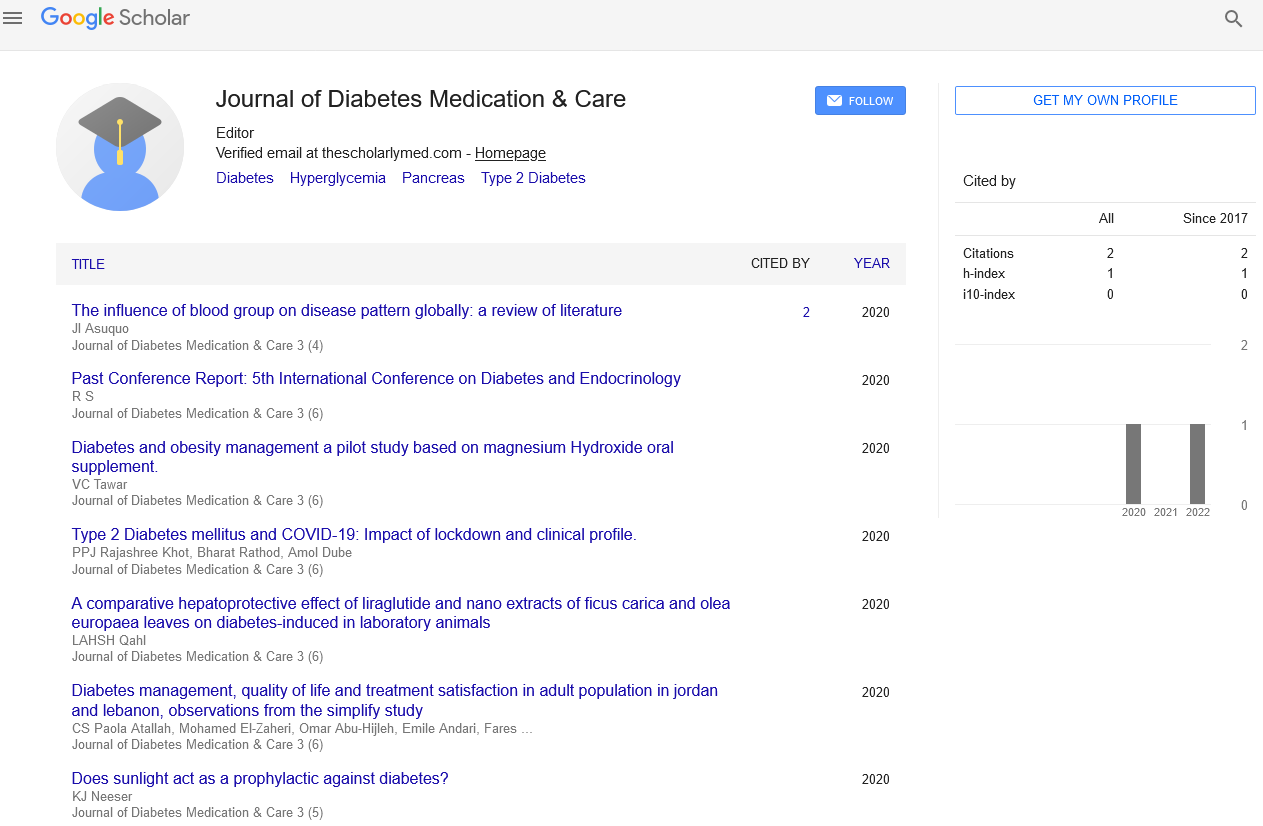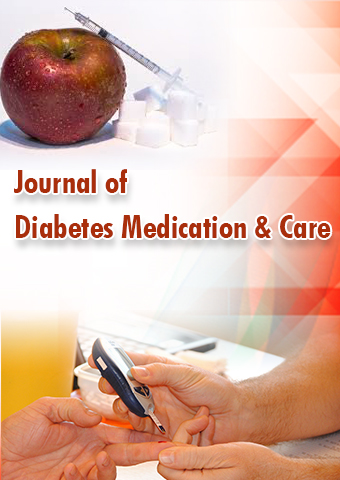Perspective - Journal of Diabetes Medication & Care (2023) Volume 6, Issue 6
A Holistic Approach to Managing Diabetes: Beyond Medications
- Corresponding Author:
- Hinnah Davoodi
Department of Endocrinology, Rabia college of Medicine, Rabia, Syria
E-mail: Davoo@24gmail.com
Received: 06-Nov-2023, Manuscript No. jdmc-23-122614; Editor assigned: 09-Sep-2023, PreQC No. jdmc-23-122614 (PQ); Reviewed: 23-Nov-2023, QC No. jdmc-23-122614; Revised: 11-Dec-2023, Manuscript No. jdmc-23-122614 (R); Published: 18-Dec-2023, DOI: 10.37532/ jdmc.2023.6(6).158-159
Introduction
Diabetes, a chronic condition affecting millions worldwide, requires a multifaceted approach to management. While medications play a crucial role, adopting a holistic approach that includes lifestyle modifications, dietary changes, and stress management can significantly enhance the quality of life for individuals with diabetes. In this article, we will explore a comprehensive strategy for managing diabetes that goes beyond conventional medication.
Description
Understanding diabetes
Before delving into the management strategies, it’s essential to understand diabetes. The condition is characterized by elevated blood sugar levels, either due to insufficient insulin production or the body’s inability to use insulin effectively. Type 1 diabetes is an autoimmune condition where the body attacks its insulin-producing cells, while type 2 diabetes typically results from a combination of genetic and lifestyle factors.
Holistic approach to managing diabetes
Balanced diet and nutritional awareness: One of the cornerstones of diabetes management is maintaining a balanced diet. Individuals with diabetes should focus on consuming a variety of nutrient-dense foods, emphasizing whole grains, lean proteins, fruits, and vegetables. Monitoring carbohydrate intake and opting for complex carbohydrates can help regulate blood sugar levels.
Portion control is crucial, and adopting a mindful eating approach can prevent overeating. Working with a registered dietitian can provide personalized guidance on creating a meal plan that meets individual nutritional needs while managing blood sugar levels.
Regular physical activity
Physical activity plays a pivotal role in diabetes management. Regular exercise helps improve insulin sensitivity, lowers blood sugar levels, and contributes to weight management. Incorporating a combination of aerobic exercises (such as walking, cycling, or swimming) and strength training into a weekly routine can yield significant benefits.
Individuals with diabetes should consult their healthcare provider before starting a new exercise program to ensure it aligns with their health status and any existing complications.
Stress management and mental well-being
Chronic stress can adversely affect blood sugar levels and overall health. Implementing stress management techniques, such as mindfulness meditation, deep breathing exercises, or yoga, can be beneficial. Additionally, seeking support from friends, family, or mental health professionals can contribute to emotional well-being.
Recognizing the impact of mental health on diabetes management is essential. Stress reduction not only positively influences blood sugar control but also enhances overall quality of life.
Adequate sleep
Sleep is often underestimated in its role in managing diabetes. Poor sleep patterns can disrupt hormonal balance and lead to insulin resistance. Establishing a regular sleep routine, creating a comfortable sleep environment, and addressing any underlying sleep disorders can contribute to improved blood sugar control.
Regular monitoring and healthcare checkups
Monitoring blood sugar levels regularly is crucial for effective diabetes management. It helps individuals make informed decisions about their diet, exercise, and medication. Regular checkups with healthcare providers allow for adjustments to treatment plans based on individual responses and evolving health conditions.
It’s important to communicate openly with healthcare professionals about any challenges or concerns related to diabetes management. Regular medical assessments can identify potential complications early, enabling timely intervention.
Medication adherence and adjustments
While this article emphasizes a holistic approach, medications remain a fundamental aspect of diabetes management. Adhering to prescribed medication regimens is crucial for maintaining stable blood sugar levels. Regular communication with healthcare providers is essential to discuss any concerns, side effects, or necessary adjustments to medication dosages.
It’s important to note that lifestyle modifications, including dietary changes and increased physical activity, can sometimes lead to adjustments in medication requirements. This should be done under the guidance of healthcare professionals.
Conclusion
Managing diabetes requires a comprehensive and individualized approach that goes beyond merely relying on medications. By adopting a balanced diet, engaging in regular physical activity, managing stress, prioritizing sleep, monitoring blood sugar levels, and staying informed about medication regimens, individuals with diabetes can lead fulfilling and healthy lives.
It’s essential to recognize that diabetes management is an ongoing process, and the strategies outlined in this article are general guidelines. Personalization is key, and individuals with diabetes should work closely with their healthcare team to create a plan that addresses their unique needs and circumstances. By embracing a holistic approach, individuals can empower themselves to take control of their health and enhance their overall well-being in the face of diabetes.

